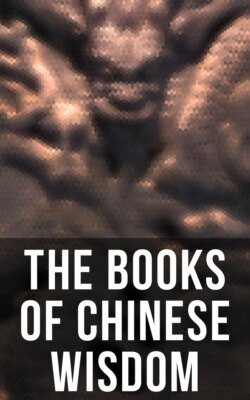Читать книгу The Books of Chinese Wisdom - Mencius - Страница 9
На сайте Литреса книга снята с продажи.
Footnotes
Оглавление1. See Plate I at the end of the Introduction.
2. Kâu-ȝze, called Kâu Tun-î and Kâu Mâu-shuh, and, still more commonly, from the rivulet near which was his favourite residence, Kâu Lien-khî. Mayers (Chinese Reader's Manual, p. 23) says:--'He held various offices of state, and was for many years at the head of a galaxy of scholars who sought for instruction in matters of philosophy and research:--second only to Kû Hsî in literary repute.'
3. Kû-ȝze Khwan shû, or Digest of Works of Kû-ȝze, chap. 26 (the first chapter on the Yî), art. 16.
4. Analects IX, viii.
5. Lî Kî VIII, iv, 16.
6. Shû V, xxii, 19.
7. See Mayers' Chinese Reader's Manual, pp. 56, 57.
8. Certainly it was not Confucius. See on the authorship of the Appendixes, and especially of Appendix III, in the next chapter.
9. For this dissection, which may also be called reductio ad absurdum, of the Lo writing, I was indebted first to P. Regis. See his Y-King I, p. 60. But Kû Hsî also has got it in the Appendix to his 'Lessons on the Yî for the Young.'
10. The Shû IV, xi, 1, 2.
11. These were well-known instances of Shâu's wanton cruelty. Observing some people one winter's day wading through a stream, he ordered their legs to be cut through at the shank-bone, that he might see the marrow which could so endure the cold. 'The good man' was a relative of his own, called Pî-kan. Having enraged Shâu by the sternness of his rebukes, the tyrant ordered his heart to be cut out, that he might see the structure of a sage's heart.
12. We do not know what these contrivances were. But to please his wife, the infamous Tâ-kî, Shâu had made 'the Heater' and, 'the Roaster,' two instruments of torture. The latter was a copper pillar laid above a pit of burning charcoal, and made slippery; culprits were forced to walk along it.
13. The Shû V, i, Sect. iii, 2, 3.
14. Shû II, ii, 18.
15. Shû V, iv, 20-31.
16. In the Book of Poetry we have Wăn's grandfather (Than-fû, III, i, ode 3, 3) divining, and his son (king Wû, III, i, ode 10. 7) doing the same.
